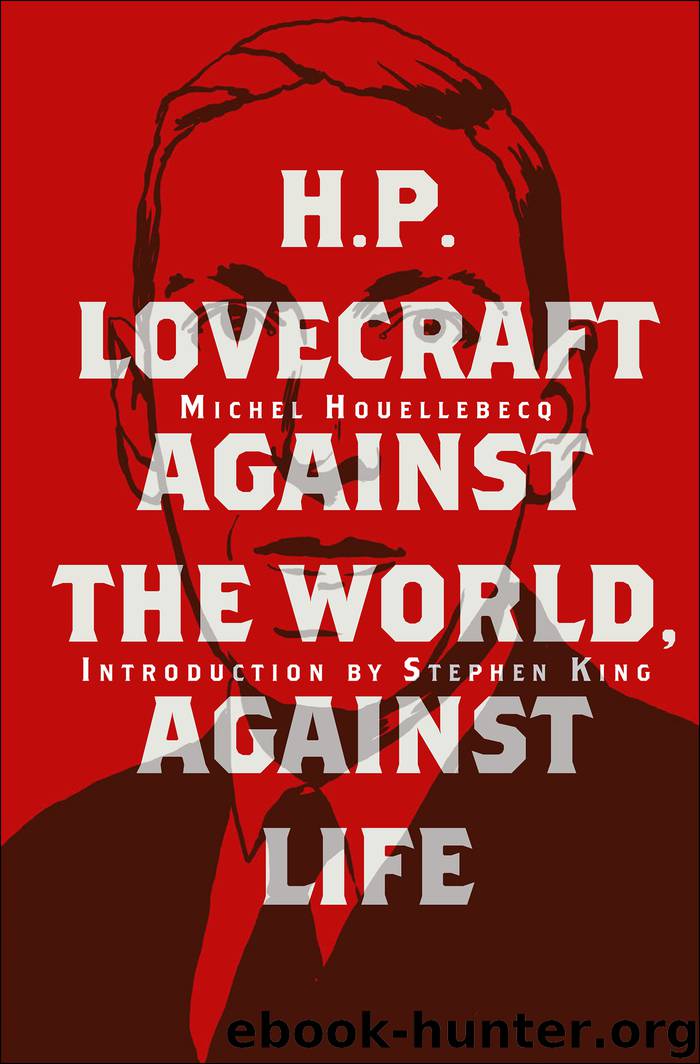H. P. Lovecraft by Michel Houellebecq

Author:Michel Houellebecq
Language: eng
Format: epub
Publisher: Abrams
And Your Senses, Vectors of Unutterable Derangement
“The air of death and desertion was ghoulish, and the smell of fish almost insufferable…”
The world stinks. The stench of cadavers and of fish blends together. A sense of failure, a hideous degeneration. The world stinks. There are no ghosts under the tumescent moon; there are only bloated cadavers, swollen and black, about to explode in pestilential vomiting.
As for the sense of touch. To touch other beings, other living entities, is an impious, repugnant experience. Their skin bloated with blisters that ooze putrid pus. Their sucking tentacles, their clutching and chewing appendages, all constitute a constant menace. Beings and their hideous corporeal vigor. A simmering, stinking Nemesis of semi-aborted chimeras, amorphous and nauseating: a sacrilege.
Sight at times delivers terror, but can also transport us before wondrous faeric architecture. But, alas, we do have five senses. And the others converge to prove that the universe is something decidedly disgusting.
* * *
It has often been noted that Lovecraft’s characters, who, especially in the “great texts,” are almost indistinguishable from one another, are merely so many projections of Lovecraft himself. Indeed—only so long as we confine the word “projection” to its simplest meaning. They are projections of the true personality of Lovecraft in much the same way that a plane surface can be the orthogonal projection of a volume. True, the general form is distinct. Usually students or professors at a New England university (preferably, Miskatonic University) who specialize in anthropology or folklore, or sometimes in political economy or in non-Euclidean geometry; discreet and reserved by nature, with long emaciated faces and who by profession and temperament lean more toward the satisfactions of the mind. This is a sort of outline, a robotic-portrait—and for the most part it is all we will ever know.
In the beginning, Lovecraft did not choose to portray interchangeable flat characters. In the stories of his youth, he seems to have made an effort each time to depict a different narrator with a social milieu, a personal story, and even a psychological profile. At times, this narrator was a poet or a man animated by poetic sentiment; this vein actually produced HPL’s most indisputable flops.
Only progressively did he come to see the futility of all psychological differentiation. His characters no longer required it; all they needed was functional sensory equipment. Their sole function, in fact, would be to perceive.
It might even be said that the deliberate banality of his characters contributes to reinforcing the compelling nature of Lovecraft’s universe. A more obtrusive psychological brushstroke would have only detracted from their testimony and diminished its transparency; we would have left the domain of material horror to enter that of psychological horror. And Lovecraft did not wish to describe psychoses, but repugnant realities.
Nonetheless, his heroes succumb to the stylistic device so cherished by horror writers that consists of the claim that their story might simply be a nightmare, bred by an overly inflamed imagination, inspired by the reading of impious books. That’s fine; we don’t believe it for an instant.
Download
This site does not store any files on its server. We only index and link to content provided by other sites. Please contact the content providers to delete copyright contents if any and email us, we'll remove relevant links or contents immediately.
| African | Asian |
| Australian & Oceanian | Canadian |
| Caribbean & Latin American | European |
| Jewish | Middle Eastern |
| Russian | United States |
4 3 2 1: A Novel by Paul Auster(12393)
The handmaid's tale by Margaret Atwood(7764)
Giovanni's Room by James Baldwin(7346)
Asking the Right Questions: A Guide to Critical Thinking by M. Neil Browne & Stuart M. Keeley(5775)
Big Magic: Creative Living Beyond Fear by Elizabeth Gilbert(5772)
Ego Is the Enemy by Ryan Holiday(5450)
The Body: A Guide for Occupants by Bill Bryson(5097)
On Writing A Memoir of the Craft by Stephen King(4944)
Ken Follett - World without end by Ken Follett(4732)
Adulting by Kelly Williams Brown(4574)
Bluets by Maggie Nelson(4556)
Eat That Frog! by Brian Tracy(4540)
Guilty Pleasures by Laurell K Hamilton(4449)
The Poetry of Pablo Neruda by Pablo Neruda(4109)
Alive: The Story of the Andes Survivors by Piers Paul Read(4033)
White Noise - A Novel by Don DeLillo(4010)
Fingerprints of the Gods by Graham Hancock(4004)
The Book of Joy by Dalai Lama(3986)
The Bookshop by Penelope Fitzgerald(3853)
